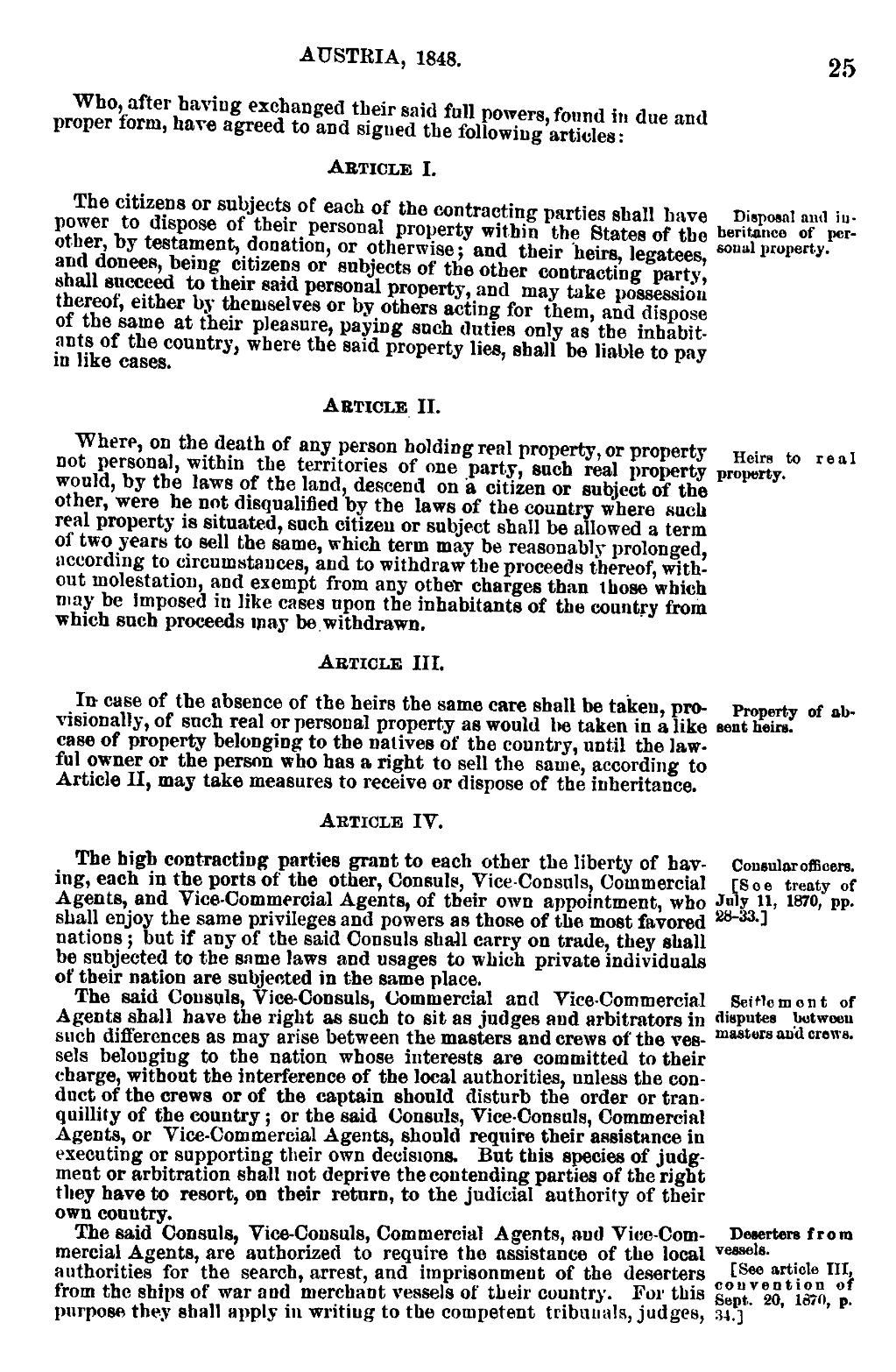AUSTRIA, 1848. 25 Who, after having exchanged their said full owers found in du n proper form, have agreed to and signed the follbwiugbrticles: 0 a d Anrrcnn I. The citizens or subjects of each of the contractins · is ; . power to dispose of their personal property withifd ptzhrdlgtagglodthe ***2**1:3*% I :’\;ml’“\;‘ other, by testament, donation, or otherwise; and their heirs legatees “°""l P'°P°"‘y‘ and donees, being citizens or subjects of the other contractihg partv’ shall succeed to their said personal property, and may take possession; thereof, either by themselves or by others acting for them, and dispose of the same at their pleasure, paying such duties only as the inhabitpuniskgfctglggscountry, where the said property lies, shall be liable to pay ARTICLE II. Where, on the death of an person holdin real ro e or ro ert · not personal, within the terifitories of one gpartyFsuI::hrt¥eal progerty prg:;:y.m mul would, by the laws of the land, descend on a citizen or subject of the other, were he not disqualified by the laws of the country where such real property is situated, such citizen or subject shall be allowed a term of two years to sell the same, which term may be reasonably prolonged, according to circumstances, and to withdraw the proceeds thereof, without molestation, and exempt from any other charges than those which may be imposed in like ca es upon the inhabitants of the country from which such proceeds may bewithdrawn. Anrrcrm III. In· case of the absence of the heirs the same care shall be taken, pro- Property or asvisionally, of such real or personal property as would be taken in a like sent heirs. case of property belonging to the natives of the country, until the lawful owner or the person who has a right to sell the same, according to Article II, may take measures to receive or dispose of the inheritance. Anrrorn IV. The high contracting parties grant to each other the liberty of hav- Cousulnroftioers. ing, each in the ports of the other, Consuls, Vice-Consuls, Commercial [Soc treaty of Agents, and Vice-Commercial Agents, of their own appointment, who {ul; IL $70, PP- shall enjoy the same privileges and powers as those of the most favored ’8'*’3·] nations; but if any of the said Consuls shall carry on trade, they shall be subjected to the same laws and usages to which private individuals of their nation are subjected in the same place. The said Consuls, Vice—Cousuls, Commercial and Vice-Commercial _Seitlcmont of Agents shall have the right as such to sit as judges and arbitrators in ¢l¤¤P¤*¤¤ l>¤¤W•>·}¤ such differences as may arise between the masters and crews of the ves- ”‘“”"'“ ““d °'°““‘ sels belonging to the nation whose interests are committed to their charge, without the interference of the local authorities, unless the conduct of the crews or of the captain should disturb the order or tranquillity of the country ; or the said Consuls, Vice-Cousuls, Commercial Agents, or Vice-Commercial Agents, should require their assistance in executing or supporting their own decisions. But this species of judgment or arbitration shall not deprive the contending parties of the right they have to resort, on their return, to the judicial authority of their own countr . The said Sllonsuls, Vice-Consuls, Commercial Agents, and Vice-Com- Dmrtcrs from mercial Agents, are authorized to require the assistance of the local v°°“°l°· _ authorities for the search, arrest, and imprisonment of the deserters c JE‘;°0:':‘,°;°“ILI; from the ships of war and merchant vessels of their country. For this S,,,,,_ 2O_ 1,,,,,, ,,_ purpose they shall apply in writing to the competent tribunals, judges, 34.]
Page:United States Statutes at Large Volume 18 Part 2c.djvu/32
This page needs to be proofread.
